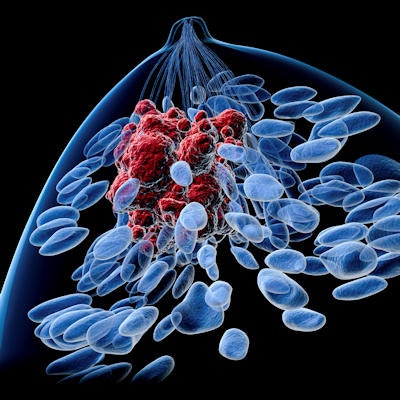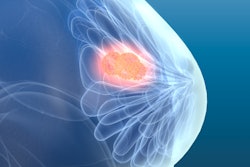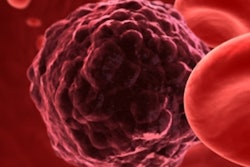
The postponement of breast imaging exams due to the COVID-19 pandemic could result in almost 2,500 additional deaths from breast cancer in the U.S. from 2020 to 2030, according to a July 14 paper in the Journal of the National Cancer Institute. But getting women back on the screening track quickly could reduce the effect.
Researchers led by Oguzhan Alagoz, PhD, from the University of Wisconsin-Madison looked at data from simulation models to determine the effect of COVID-19 on breast imaging. The models predict a cumulative increase of 0.52% for breast cancer deaths expected by 2030.
"I was indeed surprised by the results," Alagoz told AuntMinnie.com.
The pandemic initially disrupted breast cancer imaging as nonemergency exams were postponed and many healthy people avoided healthcare facilities. Reports indicate that rates of screening and diagnostic mammography dropped sharply in the first few months after the pandemic hit the U.S. in 2020, according to the study authors. Similarly, there was also a delay in cancer diagnoses.
"We know that early diagnosis and screening save lives; therefore, a huge drop in screening rates was very concerning, as this meant that many women would have been diagnosed later at advanced stages of breast cancer," Alagoz told AuntMinnie.com.
To analyze the potential effects, the team used three independently developed breast cancer simulation models from the U.S. National Cancer Institute's Cancer Intervention and Surveillance Modeling Network (CISNET). The researchers wanted to predict the effect on breast cancer mortality of interruptions stemming from the first six months of the pandemic.
Alagoz and colleagues took into account reductions in mammography screening use, delays in symptomatic cancer diagnosis, and reduced use of chemotherapy for women with early-stage disease for the first six months of the pandemic, and they measured how long it took to return to prepandemic patterns. Based on available data, they estimated that 50% of women who were scheduled to have a mammogram missed their appointment.
The models project approximately 2,500 cumulative excess breast cancer deaths in the U.S. through 2030 due to delays in screening and treatment.
| Effect of delayed breast imaging from COVID-19 on cancer deaths | |
| Cause | Estimated excess breast cancer deaths |
| Delayed diagnosis of symptomatic cases | 1,314 |
| Reduced screening | 950 |
| Reduced chemotherapy use | 151 |
| Total | 2,487 |
The researchers also compared breast cancer deaths between women who skipped screening and waited until their next scheduled mammogram and those who delayed screening for six months and did a makeup exam. They found that the number of breast cancer deaths was 4.5 times higher when women skipped their mammograms entirely, compared to delaying it and making it up later.
"This is a striking example demonstrating how crucial it is to have the makeup exam as soon as possible," Alagoz said.
Alagoz said the team also found that many health systems and mammography practices did a good job in catching up with screening and diagnosis services toward the end of the summer of 2020. This limited the negative effects of the pandemic on breast cancer control.
"I was very worried about a much larger impact due to the pandemic on breast cancer deaths," he told AuntMinnie.com. "It is still not small; approximately 2,500 additional breast cancer deaths over the next 10 years is still concerning."
Dr. Stamatia Destounis, chief of the American College of Radiology (ACR) Commission on Breast Imaging, said she agrees that the quick actions of healthcare facilities positively affected breast cancer mortality.
The ACR supported local efforts with the Return to Mammography Care campaign, providing guidance to safely resume screening, reconnect with women to schedule their mammograms, and help women prepare.
"Sites adapted and overcame largely unprecedented circumstances to safely and efficiently resume care," she said. "I am proud that the imaging community came together to save lives."




















